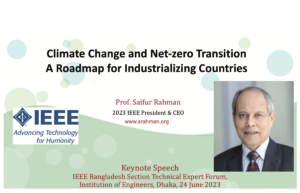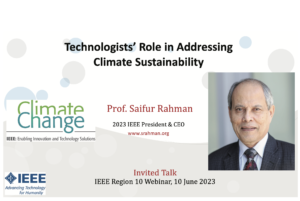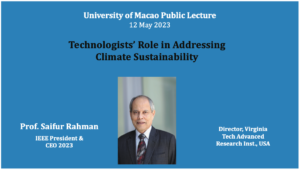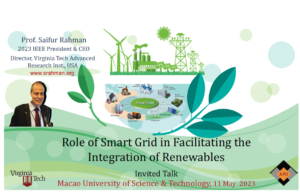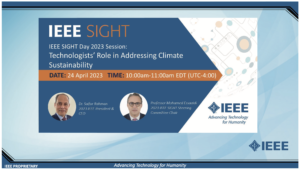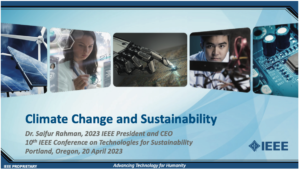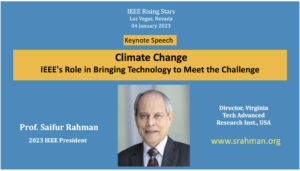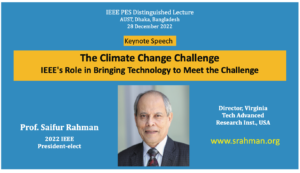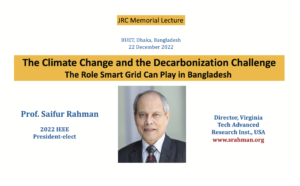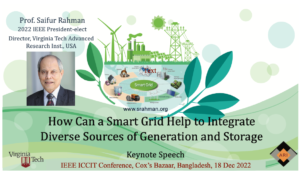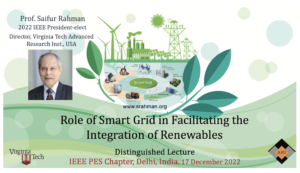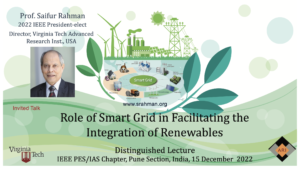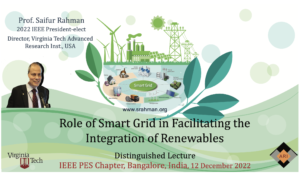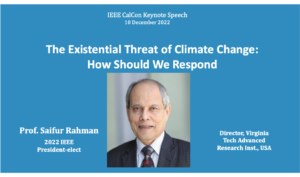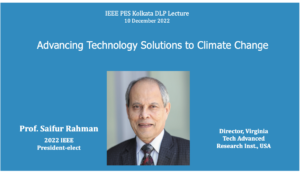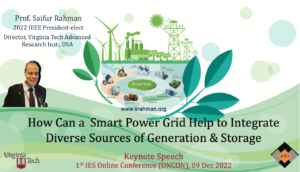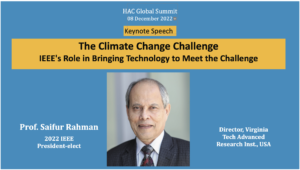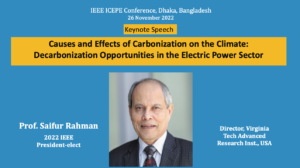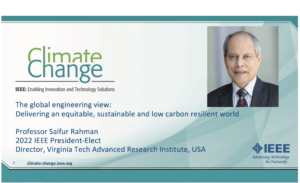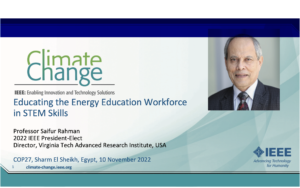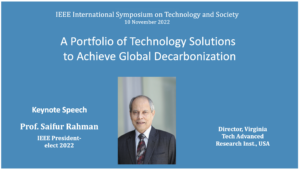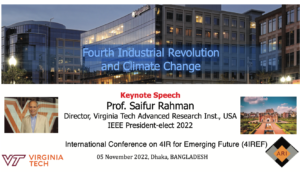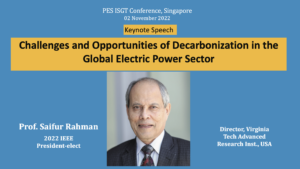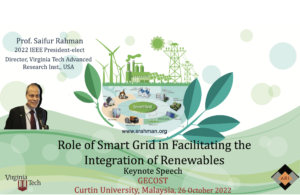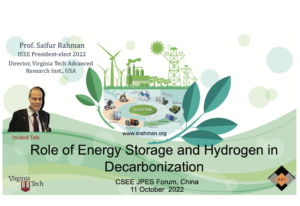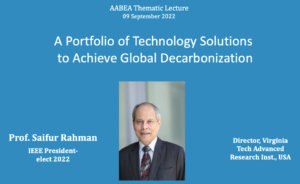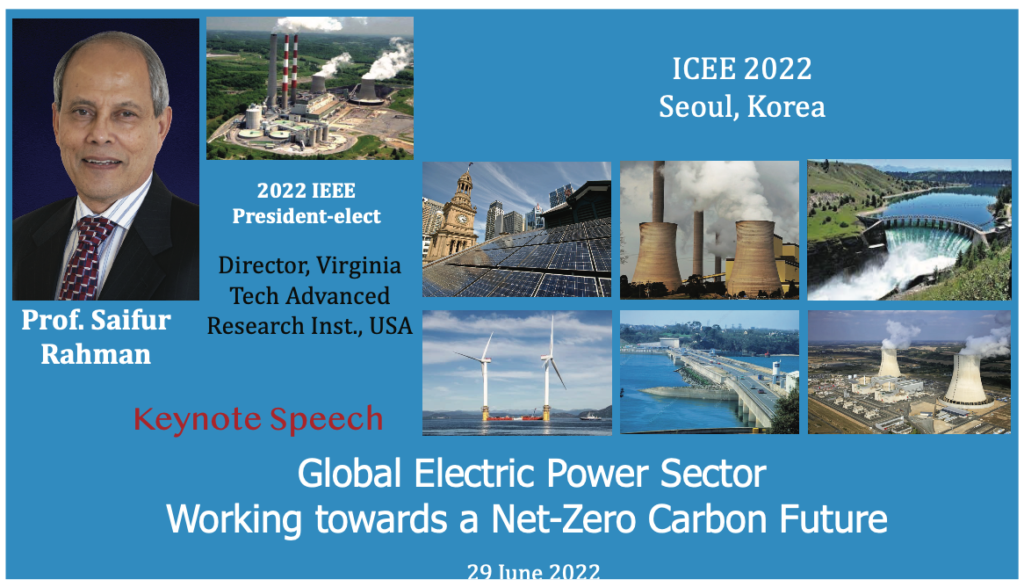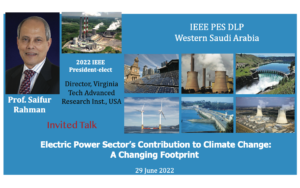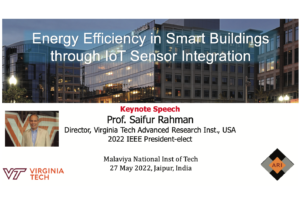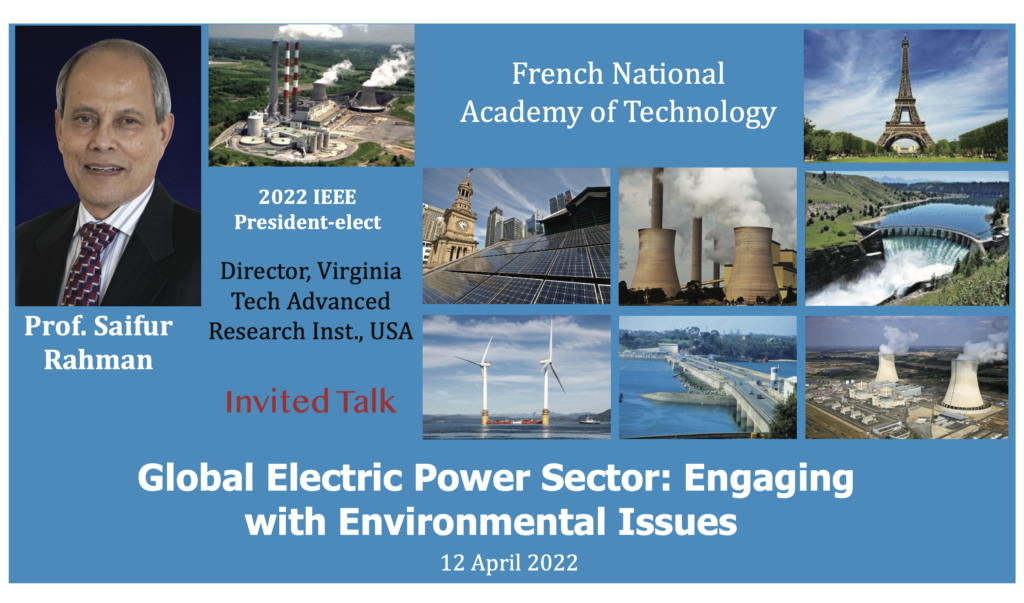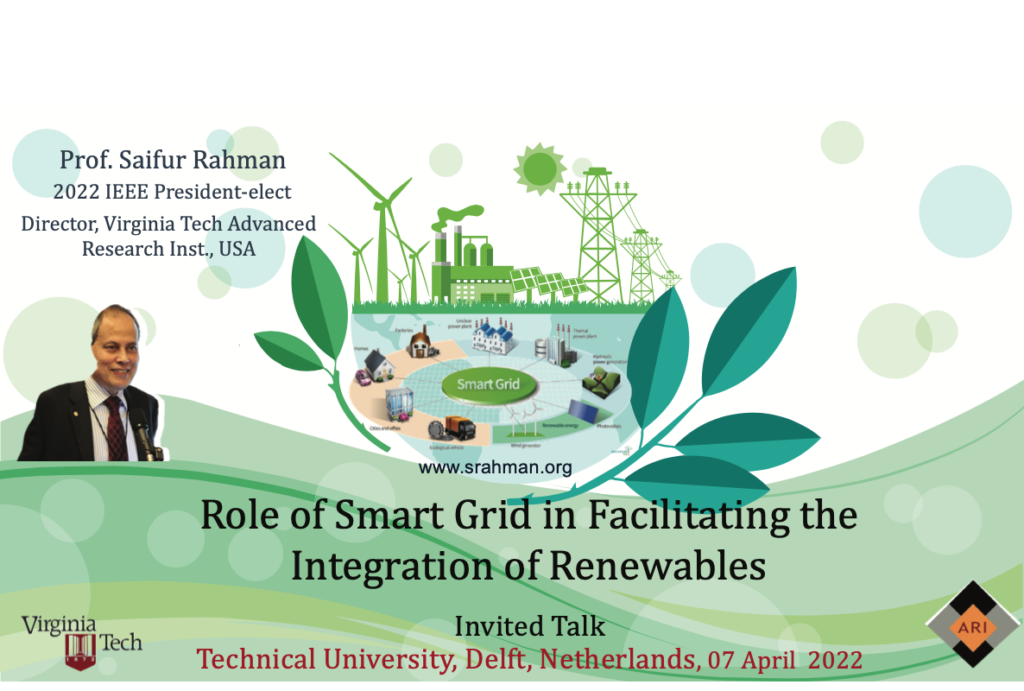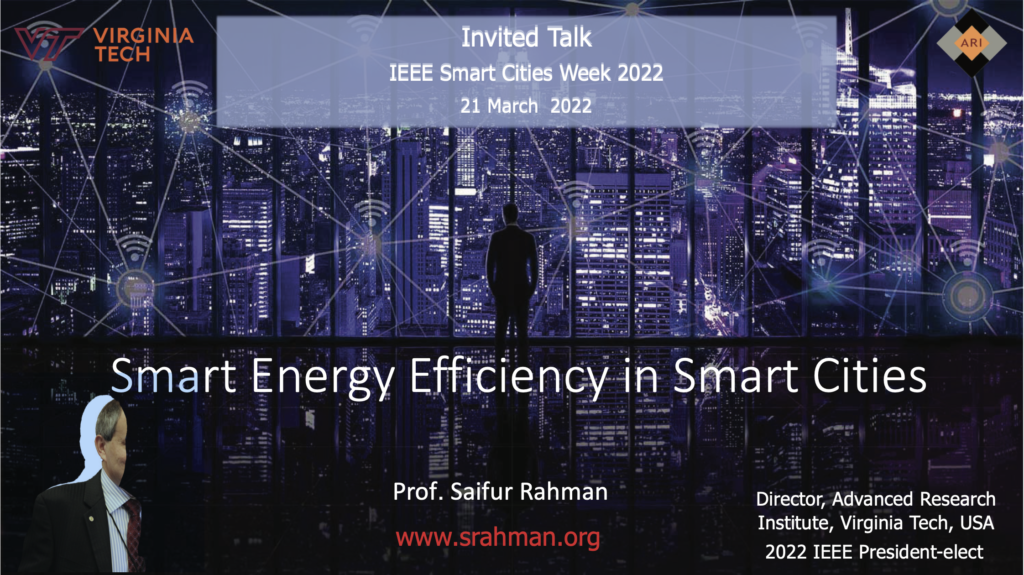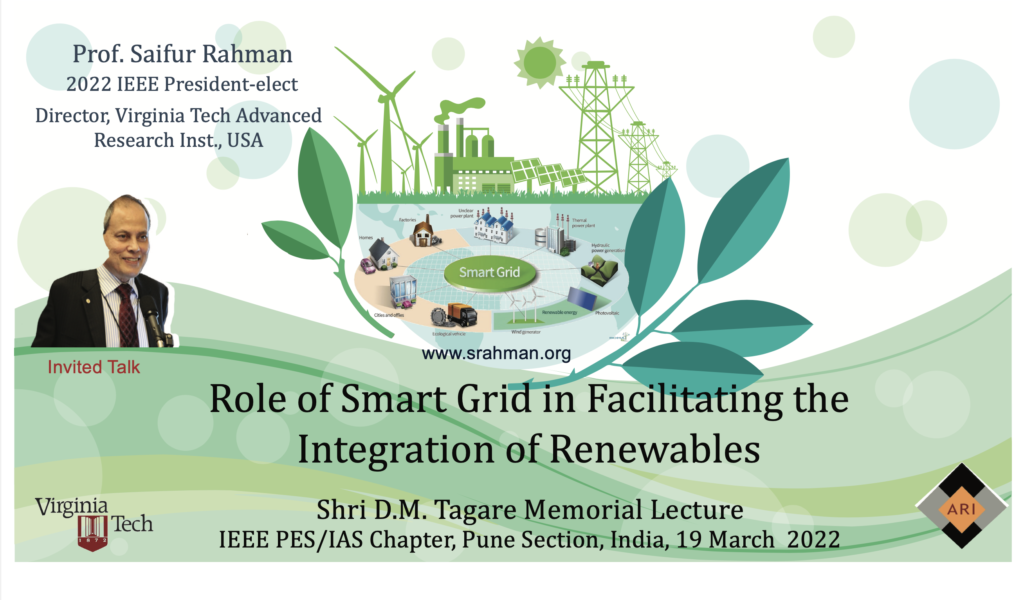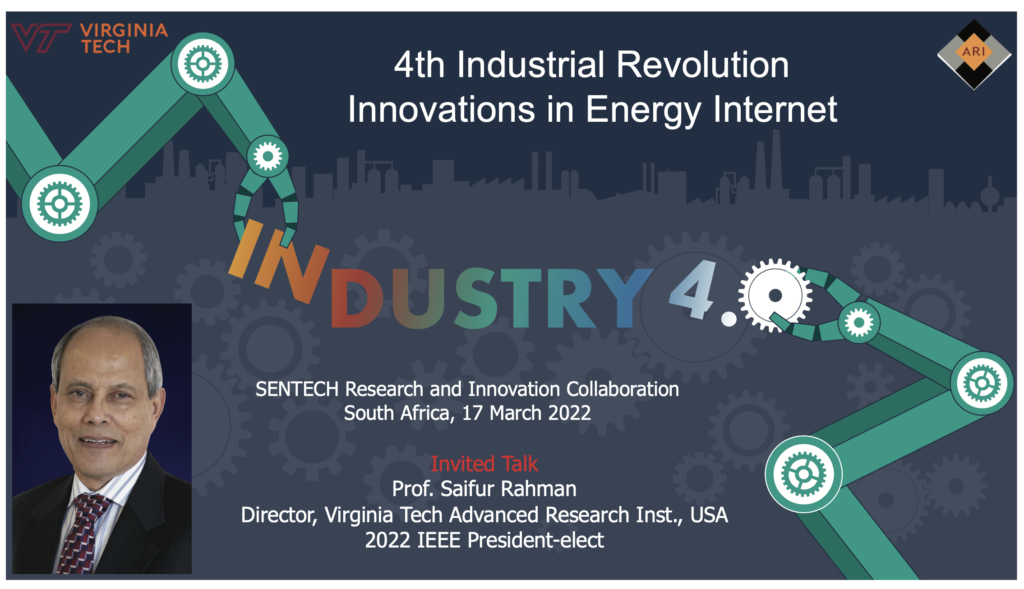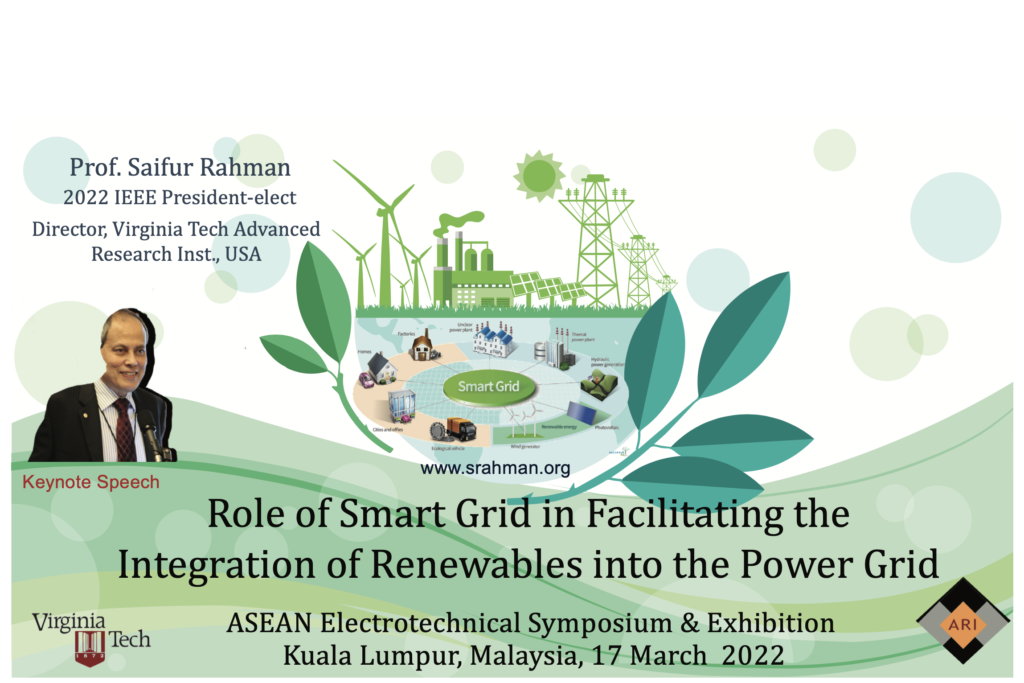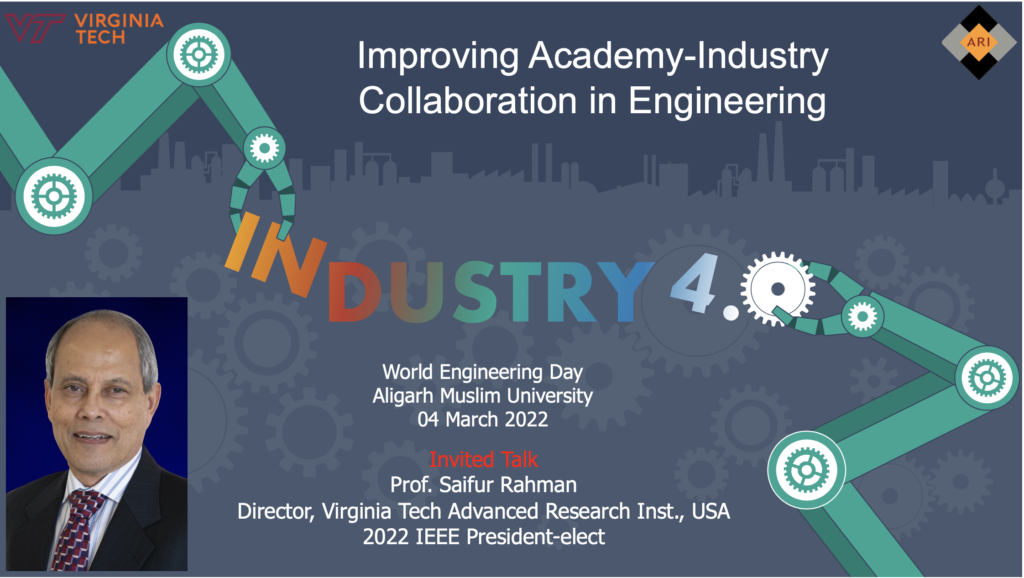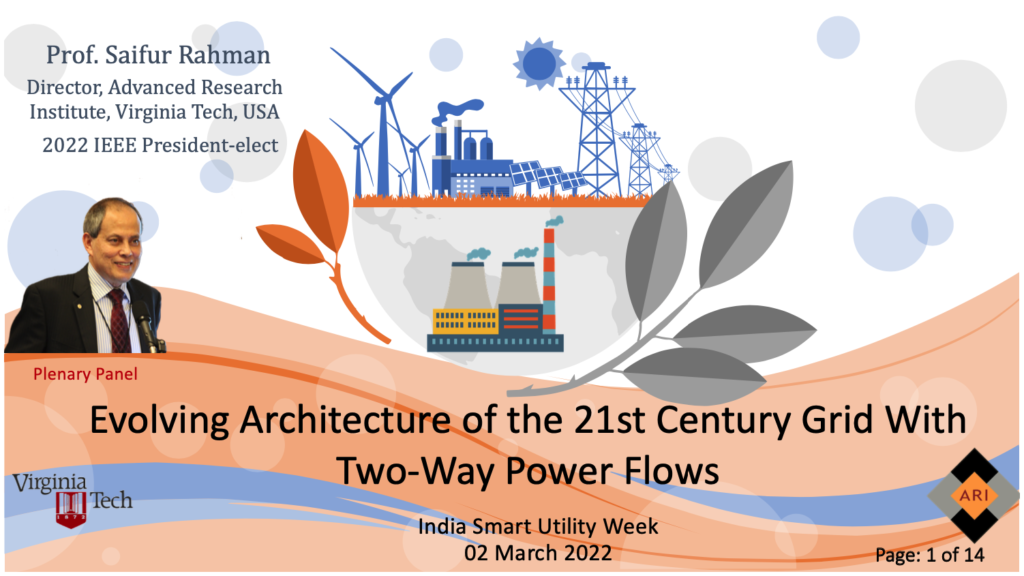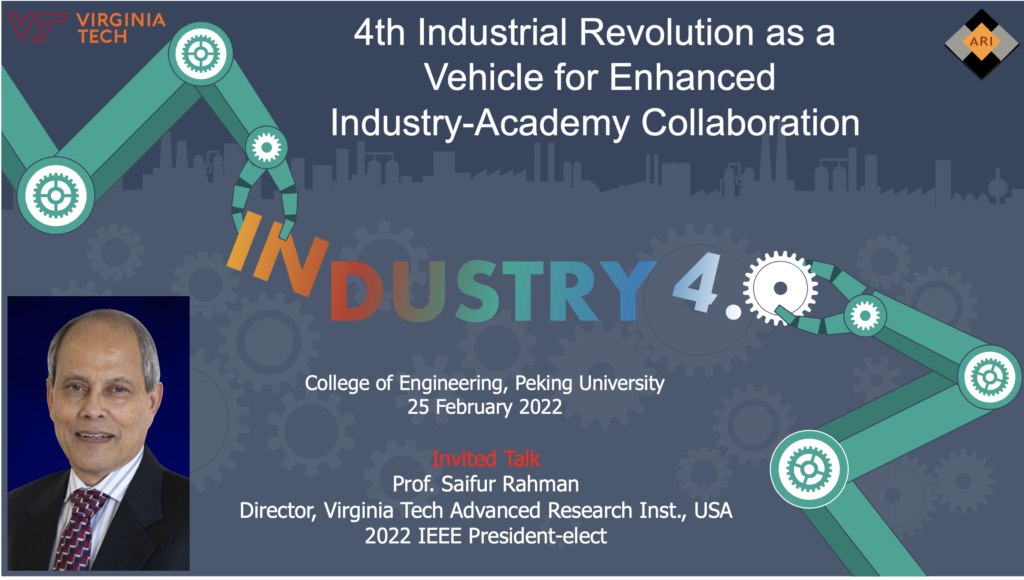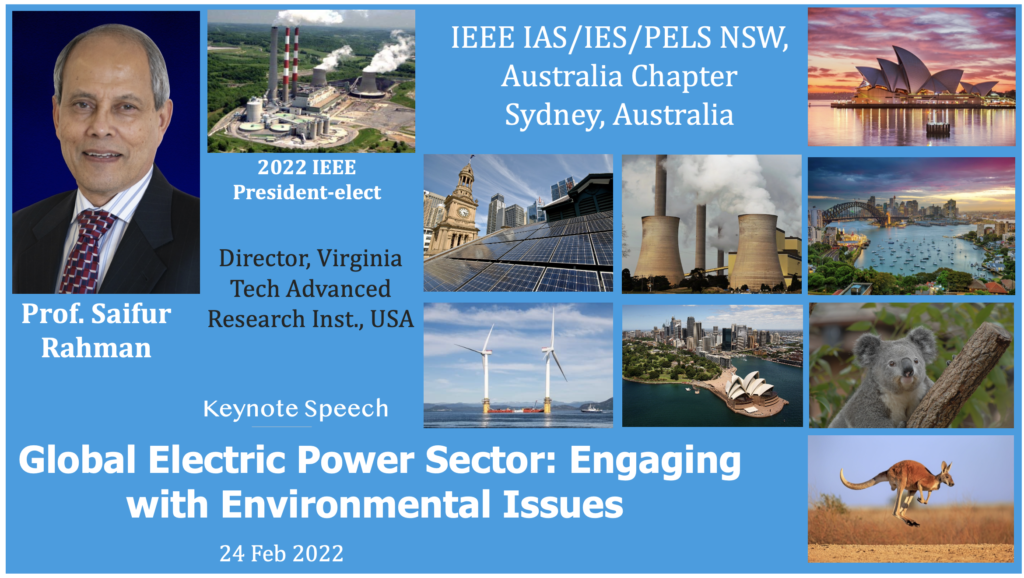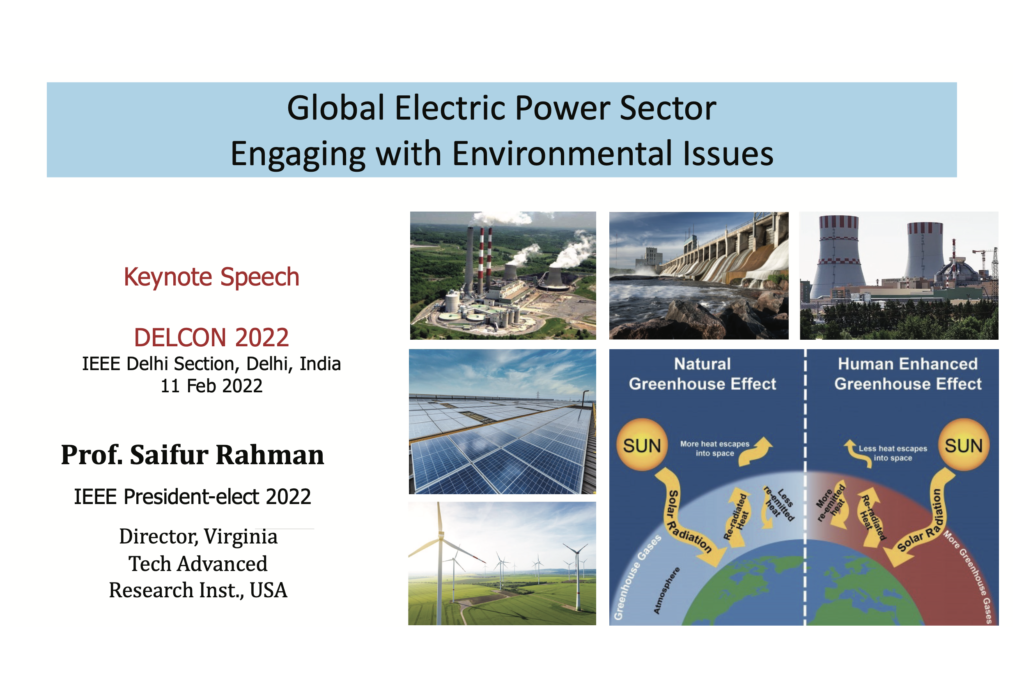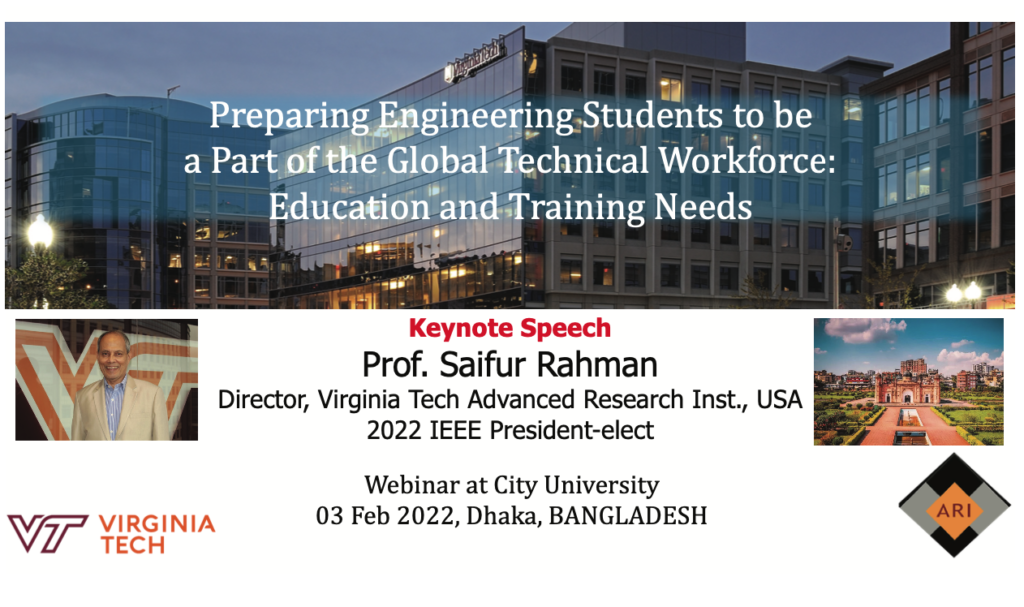Webinars
Date
Description of Recent and Upcoming Webinars
Webinar Presentation
24 June 2023
Dhaka, Bangladesh
Climate Change and Net-Zero Transition: A Roadmap for Industrializing Countries
Keynote Speech, IEEE Bangladesh Section Technical Experts Forum, Institute of Engineers, Dhaka, Bangladesh
There is an unprecedented level of awareness of climate change and the role of decarbonization in enabling environmental sustainability moving forward. In particular, there has been a major focus placed on the carbon produced through electricity generation, as it is responsible for roughly 30% of emissions globally. While industrialized nations are slowly moving away from fossil-fuel based electricity, emerging economies are still heavily reliant on fossil fuels which are the most readily available electricity generation sources for them.
Thus, there is a tension that needs to be navigated if we are to meet carbon reduction targets – and they are, to be clear, shared targets. A nuanced approach to navigating this tension will see industrialized nation states collaborating with emerging economies to deploy a portfolio of solutions with low-carbon generation, storage and demand side management with advanced technology focusing on energy efficiency.
IEB, Dhaka
24 June 2023
Saifur Rahman, PhD
Joseph Loring Professor & Director
Advanced Research Institute
Virginia Tech, USA
2023 IEEE President & CEO
10 June 2023
Region 10
Technologists’ Role in Addressing Climate Sustainability
Invited Talk, IEEE Region 10
There is an unprecedented level of awareness of climate change and the role of decarbonization in enabling environmental sustainability moving forward. In particular, there has been a major focus placed on the carbon produced through electricity generation, as it is responsible for roughly 30% of emissions globally.
While industrialized nations are slowly moving away from fossil-fuel based electricity, emerging economies are still heavily reliant on fossil fuels which are the most readily available electricity generation sources for them. Thus, there is a tension that needs to be navigated if we are to meet carbon reduction targets – and they are, to be clear, shared targets. A nuanced approach to navigating this tension will see industrialized nation states collaborating with emerging economies to deploy a portfolio of solutions with low-carbon generation, storage and demand side management with advanced technology focusing on energy efficiency.
Saifur Rahman, PhD
Joseph Loring Professor & Director
Advanced Research Institute
Virginia Tech, USA
2023 IEEE President & CEO
12 May 2023
Macao
Technologists’ Role in Addressing Climate Sustainability
Public Lecture, University of Macao
There is an unprecedented level of awareness of climate change and the role of decarbonization in enabling environmental sustainability moving forward. In particular, there has been a major focus placed on the carbon produced through electricity generation, as it is responsible for roughly 30% of emissions globally. While industrialized nations are slowly moving away from fossil-fuel based electricity, emerging economies are still heavily reliant on fossil fuels which are the most readily available electricity generation sources for them.
Thus, there is a tension that needs to be navigated if we are to meet carbon reduction targets – and they are, to be clear, shared targets. A nuanced approach to navigating this tension will see industrialized nation states collaborating with emerging economies to deploy a portfolio of solutions with low-carbon generation, storage and demand side management with advanced technology focusing on energy efficiency.
Public Lecture
University of Macao
12 May 2023
11 May 2023
Macao
Role of the Smart Grid in Facilitating the Integration of Renewables
Invited Talk, Macau University of Science & Technology
With the focus on environmental sustainability and energy security, power system planners are looking at renewable energy as supplements and alternatives. But such generation sources have their own challenges – primarily intermittency. It is expected that the smart grid – due to its inherent communication, sensing and control capabilities – will have the ability to manage the load, storage and generation assets (including renewables) in the power grid to enable a large-scale integration of distributed generation. In a smart grid, information about the state of the grid and its components can be exchanged quickly over long distances and complex networks.
It will therefore be possible to have the integration of sustainable energy sources, such as wind, solar, off-shore electricity, etc. for smoother system operation. But in order for this to be possible, the electric utility will have to evolve, and change their ways of operation to become an intelligent provider of these services. This lecture introduces the operational characteristics of renewable energy sources, and various aspects of the smart grid – technology, standards and regulations. It also addresses the interplay among distributed generation, storage and conventional generation to provide an efficient operational strategy in the context of the smart grid.
Macau University of Science & Technology, Macau
11 May 2023
24 April 2023
USA
Technologists’ Role in Addressing Climate Sustainability
Keynote Speech, IEEE SIGHT day
There is an unprecedented level of awareness of climate change and the role of decarbonization in enabling environmental sustainability moving forward. In particular, there has been a major focus placed on the carbon produced through electricity generation, as it is responsible for roughly 30% of emissions globally. While industrialized nations are slowly moving away from fossil-fuel based electricity, emerging economies are still heavily reliant on fossil fuels which are the most readily available electricity generation sources for them.
Thus, there is a tension that needs to be navigated if we are to meet carbon reduction targets – and they are, to be clear, shared targets. A nuanced approach to navigating this tension will see industrialized nation states collaborating with emerging economies to deploy a portfolio of solutions with low-carbon generation, storage and demand side management with advanced technology focusing on energy efficiency. To more efficiently facilitate the global shift towards renewable energy adoption, the below six areas should be our priority to address climate change.
- Energy Efficiency Applications
- Carbon Capture Systems
- Renewable Energy Integration
- Hydrogen and Storage Solutions
- Cross-Border Energy Transfer
- Advanced Nuclear Technologies
Saifur Rahman, PhD
Joseph Loring Professor & Director
Advanced Research Institute
Virginia Tech, USA
2023 IEEE President & CEO
20 April 2023
Portland, OR
Climate Change and Sustainability
Invited Talk, 10th IEEE Conference on Technologiesfor Sustainability
A rising level of greenhouse gas emissions, its effect on life and property, food production and human productivity on the planet are raising alarm bells in the civil society, among policy makers and industry leaders. At the same time, there is a lack of agreement between industrialized nations and emerging economies about the approach to global decarbonization efforts in the electric power, transportation, ICT, buildings, agriculture and the manufacturing sectors. The presentation proposes a portfolio of solutions with low-carbon generation which can be equally attractive to both groups of the countries.
It starts with the causes and effects of carbonization and mitigation opportunities. A major focus is placed on the CO2 produced through electricity production, as it is responsible for roughly 30% of carbon emissions globally. The portfolio includes renewables, nuclear, carbon capture and sequestration, storage, cross-border electricity transfer and advanced technology focusing on energy efficiency. The presentation concludes with programs and activities within IEEE which helps to raise awareness about cleantech solutions to promote climate sustainability through conferences, publications and social media.
Saifur Rahman, PhD
Joseph Loring Professor & Director
Advanced Research Institute
Virginia Tech, USA
2023 IEEE President & CEO
02 March 2023
Singapore
Role of the Smart Grid in Facilitating the Integration of Renewables
Invited Talk, National University of Singapore
With the focus on environmental sustainability and energy security, power system planners are looking at renewable energy as supplements and alternatives. But such generation sources have their own challenges – primarily intermittency. It is expected that the smart grid – due to its inherent communication, sensing and control capabilities – will have the ability to manage the load, storage and generation assets (including renewables) in the power grid to enable a large-scale integration of distributed generation.
In a smart grid, information about the state of the grid and its components can be exchanged quickly over long distances and complex networks. It will therefore be possible to have the integration of sustainable energy sources, such as wind, solar, off-shore electricity, etc. for smoother system operation. But in order for this to be possible, the electric utility will have to evolve, and change their ways of operation to become an intelligent provider of these services. This lecture introduces the operational characteristics of renewable energy sources, and various aspects of the smart grid – technology, standards and regulations. It also addresses the interplay among distributed generation, storage and conventional generation to provide an efficient operational strategy in the context of the smart grid.
National University of Singapore
13 February 2023
Cairo, Egypt
Clean Tech Solutions for Climate Change
Invited Talk, IEEE TEMS Egypt Chapter, Cairo, Egypt
A rising level of greenhouse gas emissions, its effect on life and property, food production and human productivity on the planet are raising alarm bells in the civil society, among policy makers and industry leaders. At the same time, there is a tension between industrialized nations and emerging economies about the approach to global decarbonization efforts in the electric power, transportation, ICT, buildings, agriculture and the manufacturing sectors.
This presentation addresses the causes and effects of carbonization and mitigation opportunities. A major focus is placed on the carbon produced through electricity production, as it is responsible for roughly 30% of carbon emissions globally. The challenge of decarbonization in this sector can be addressed using a portfolio of solutions with low-carbon generation (including renewables & nuclear), carbon capture and sequestration, storage, cross-border electricity transfer and advanced technology focusing on energy efficiency.
Invited Talk
IEEE TEMS Egypt Chapter
Cairo, Egypt
13 February 2022
04 January 2023
Las Vegas, USA
Climate Change: IEEE’s Role in Bringing Technology to Meet the Challenge
Keynote Speech, IEEE Rising Stars, Las Vegas
A rising level of greenhouse gas emissions, its effect on life and property, food production and human productivity on the planet are raising alarm bells in the civil society, among policy makers and industry leaders. At the same time, there is a tension between industrialized nations and emerging economies about the approach to global decarbonization efforts in the electric power, transportation, ICT, buildings, agriculture and the manufacturing sectors. This presentation addresses the causes and effects of carbonization and mitigation opportunities.
A major focus is placed on the carbon produced through electricity production, as it is responsible for roughly 30% of carbon emissions globally. The challenge of decarbonization in this sector can be addressed using a portfolio of solutions with low-carbon generation (including renewables & nuclear), carbon capture and sequestration, storage, cross-border electricity transfer and advanced technology focusing on energy efficiency.
IEEE Rising Stars
Las Vegas, USA
January 04, 2023
28 December 2022
AUST Dhaka, Bangladesh
The Climate Change Challenge: IEEE’s Role in Bringing Technology to Meet the Challenge
IEEE PES Distinguished Lecture, AUST, Dhaka, Bangladesh
A rising level of greenhouse gas emissions, its effect on life and property, food production and human productivity on the planet are raising alarm bells in the civil society, among policy makers and industry leaders. At the same time, there is a tension between industrialized nations and emerging economies about the approach to global decarbonization efforts in the electric power, transportation, ICT, buildings, agriculture and the manufacturing sectors. This presentation addresses the causes and effects of carbonization and mitigation opportunities.
A major focus is placed on the carbon produced through electricity production, as it is responsible for roughly 30% of carbon emissions globally. The challenge of decarbonization in this sector can be addressed using a portfolio of solutions with low-carbon generation (including renewables & nuclear), carbon capture and sequestration, storage, cross-border electricity transfer and advanced technology focusing on energy efficiency.
IEEE PES Distinguished Lecture
AUST, Dhaka, Bangladesh
28 December 2022
22 December 2022
BUET Dhaka, Bangladesh
The Climate Change and the Decarbonization Challenge The Role Smart Grid Can Play in Bangladesh
JRC Memorial Lecture, Buet, Dhaka, Bangladesh
This lecture addresses what is climate change, what is causing it and how it is impacting the daily lives of citizens around the world. It discusses how decarbonization can help mitigate the effects of climate change with renewable energy and smart grid providing a path to the solution in Bangladesh. Some of the emerging and latest technologies being deployed for Smart Grid will be highlighted.
This lecture also addresses the interplay among distributed generation, storage and conventional generation to provide an efficient operational strategy in the context of the smart grid. This will help to deploy energy efficient technologies and integrate wind, solar, and cross-border power transfer for smoother electric power system operation. But, in order for this to be possible, the electric utility will have to evolve, and change their ways of operation to become an intelligent provider of these services.
JRC Memorial Lecture
BUET
18 December 2022
Bangladesh
How Can a Smart Grid Help to Integrate Diverse Sources of Generation and Storage
Keynote Speech, IEEE ICCIT Conference, Cox’s Bazaar, Bangladesh
With the focus on environmental sustainability and energy security, power system planners are looking at renewable energy and storage as supplements and alternatives. But such generation sources have their own challenges – primarily intermittency. It is expected that the smart grid – due to its inherent communication, sensing and control capabilities – will have the ability to manage the load, storage and generation assets (including renewables) in the power grid to enable a large-scale integration of distributed generation.
In a smart grid, information about the state of the grid and its components can be exchanged quickly over long distances and complex networks. It will therefore be possible to have the integration of sustainable energy sources, such as wind, solar, off-shore electricity, etc. for smoother system operation.
The future electric utility will become an intelligent provider of these services. This lecture introduces the operational characteristics of renewable energy sources, and various aspects of the smart grid – technology, standards and regulations. It also addresses the interplay among distributed generation, storage and conventional generation to provide an efficient operational strategy in the context of the smart grid.
Saifur Rahman, PhD
Joseph Loring Professor & Director
Advanced Research Institute
Virginia Tech, USA
2022 IEEE President-elect
IEEE ICICT
Cox’s Bazaar, Bangladesh
17 December 2022
Delhi, India
Role of the Smart Grid in Facilitating the Integration of Renewables
Distinguished Lecture, IEEE PES Chapter, Delhi, India
With the focus on environmental sustainability and energy security, power system planners are looking at renewable energy as supplements and alternatives. But such generation sources have their own challenges – primarily intermittency. It is expected that the smart grid – due to its inherent communication, sensing and control capabilities – will have the ability to manage the load, storage and generation assets (including renewables) in the power grid to enable a large-scale integration of distributed generation.
In a smart grid, information about the state of the grid and its components can be exchanged quickly over long distances and complex networks. It will therefore be possible to have the integration of sustainable energy sources, such as wind, solar, off-shore electricity, etc. for smoother system operation. But in order for this to be possible, the electric utility will have to evolve, and change their ways of operation to become an intelligent provider of these services. This lecture introduces the operational characteristics of renewable energy sources, and various aspects of the smart grid – technology, standards and regulations. It also addresses the interplay among distributed generation, storage and conventional generation to provide an efficient operational strategy in the context of the smart grid.
DLP Talk, Jamia Milia, New Delhi, India
17 December 2022
15 December 2022
Pune, India
Role of the Smart Grid in Facilitating the Integration of Renewables
Distinguished Lecture, IEEE PES/IAS Chapter, Pune, India
With the focus on environmental sustainability and energy security, power system planners are looking at renewable energy as supplements and alternatives. But such generation sources have their own challenges – primarily intermittency. It is expected that the smart grid – due to its inherent communication, sensing and control capabilities – will have the ability to manage the load, storage and generation assets (including renewables) in the power grid to enable a large-scale integration of distributed generation.
In a smart grid, information about the state of the grid and its components can be exchanged quickly over long distances and complex networks. It will therefore be possible to have the integration of sustainable energy sources, such as wind, solar, off-shore electricity, etc. for smoother system operation. But in order for this to be possible, the electric utility will have to evolve, and change their ways of operation to become an intelligent provider of these services. This lecture introduces the operational characteristics of renewable energy sources, and various aspects of the smart grid – technology, standards and regulations. It also addresses the interplay among distributed generation, storage and conventional generation to provide an efficient operational strategy in the context of the smart grid.
Pune, India
15 Dec 2022
12 December 2022
Bangalore, India
Role of the Smart Grid in Facilitating the Integration of Renewables
Distinguished Lecture, IEEE PES Chapter, Bangalore, India
With the focus on environmental sustainability and energy security, power system planners are looking at renewable energy as supplements and alternatives. But such generation sources have their own challenges – primarily intermittency. It is expected that the smart grid – due to its inherent communication, sensing and control capabilities – will have the ability to manage the load, storage and generation assets (including renewables) in the power grid to enable a large-scale integration of distributed generation.
In a smart grid, information about the state of the grid and its components can be exchanged quickly over long distances and complex networks. It will therefore be possible to have the integration of sustainable energy sources, such as wind, solar, off-shore electricity, etc. for smoother system operation. But in order for this to be possible, the electric utility will have to evolve, and change their ways of operation to become an intelligent provider of these services. This lecture introduces the operational characteristics of renewable energy sources, and various aspects of the smart grid – technology, standards and regulations. It also addresses the interplay among distributed generation, storage and conventional generation to provide an efficient operational strategy in the context of the smart grid.
DLP Talk, PES Bangalore Chapter, India
12 December 2022
10 December 2022
Kolkata, India
The Existential Threat of Climate Change: How Should We Respond?
Keynote Speech, IEEE CalCon
This lecture will address what is climate change, what is causing it and how it is impacting the daily lives of citizens around the world. In the context the author will the issue of greenhouse gas emissions and how it can be reduced to help mitigate the effect of climate change.
There has been a major focus placed on the carbon produced through electricity generation, as it is responsible for roughly 30% of emissions globally, When focusing on the energy sector alone, it is apparent that nation states are coalescing into two groups when targeting carbon reductions:
- Industrialized nation states, which have been responsible for the vast majority of the total CO2 emissions thus far.
- Emerging economies, which are less responsible for past carbon emissions, but increasing their carbon emissions at a much faster rate.
As the former pushes the latter, which are heavily reliant on fossil fuels to transition towards renewable energy solutions in the future, there is a tension that needs to be navigated if we are to meet CO2 reduction targets globally– and they are, to be clear, shared targets.
A nuanced approach to navigating this tension will be presented which will require industrialized nation states to collaborate with emerging economies to deploy a portfolio of solutions with low-carbon generation including nuclear, hydrogen, storage and demand side management with advanced technology focusing on energy efficiency.
Saifur Rahman, PhD
Professor, Virginia Tech
2022 IEEE President-elect
10 December 2022
Kolkata, India
Advancing Technology Solutions to Climate Change
DLP Lecture, IEEE PES Kolkata Chapter
China, US, India, Japan and Russia are the top five countries in terms of electricity generation capacity. Between them they had a total capacity of 3,650 million kW in 2016. In terms of fuel sources for electricity coal, natural gas, hydro, nuclear, renewables and oil provided 38.3%, 22.9%, 16.3%, 10.2%, 9% and 3.3% respectively in 2017. This means almost two-thirds of the global electricity production came from fossil fuels in that year. This is reflected in about 10 billion tons of CO2 from electricity generation or about a third of the global production.
However, this mix is expected to change significantly in the next 10 years. By 2030 installed power generation capacities from wind, solar PV, hydro power, nuclear and thermal are going to reach 540 GW, 420 GW, 530 GW, 160 GW and 1200 GW respectively. The top five CO2 emitting countries are: China, United States, India, Russian Federation and Japan. However, CO2 is not the only concern against global warming. The Global Warming Potentials (GWP) of greenhouse gases are as follows: CO2 (1), Methane (28), Hydro fluorocarbons (138), Nitrous oxide (265), Per fluorocarbons (6,630) and Sulphur hexafluoride (23,500). This challenge can be addressed using a portfolio of solutions with low-carbon generation (including renewables & nuclear), storage and demand side management with advanced technology focusing on energy efficiency. But if emission from the transportation sector continues to rise, the drop in power sector contributions will not be enough. Large scale Electric Vehicle deployment will help, but question remains – how the EV will be powered.
DLP Lecture
IEEE PES Kolkata Chapter
10 December 2022
Kolkata, India
09 December 2022
Kharagpur, India
How Can a Smart Power Grid Help to Integrate Diverse Sources of Generation and Storage
Keynote Speech, First IES Online Conference (ONCON), Kharagpur, India
With the focus on environmental sustainability and energy security, power system planners are looking at renewable energy and storage as supplements and alternatives. But such generation sources have their own challenges – primarily intermittency. It is expected that the smart grid – due to its inherent communication, sensing and control capabilities – will have the ability to manage the load, storage and generation assets (including renewables) in the power grid to enable a large-scale integration of distributed generation.
In a smart grid, information about the state of the grid and its components can be exchanged quickly over long distances and complex networks. It will therefore be possible to have the integration of sustainable energy sources, such as wind, solar, off-shore electricity, etc. for smoother system operation.
The future electric utility will become an intelligent provider of these services. This lecture introduces the operational characteristics of renewable energy sources, and various aspects of the smart grid – technology, standards and regulations. It also addresses the interplay among distributed generation, storage and conventional generation to provide an efficient operational strategy in the context of the smart grid.
IES OnCon, Kharagpur
9 December 2022
08 December 2022
Global Summit
The Climate Change Challenge: IEEE’s Role in Bringing Technology to Meet the Challenge
Keynote Speech, HAC Global Summit Lecture
A rising level of greenhouse gas emissions, its effect on life and property, food production and human productivity on the planet are raising alarm bells in the civil society, among policy makers and industry leaders. At the same time, there is a tension between industrialized nations and emerging economies about the approach to global decarbonization efforts in the electric power, transportation, ICT, buildings, agriculture and the manufacturing sectors.
This presentation addresses the causes and effects of carbonization and mitigation opportunities. A major focus is placed on the carbon produced through electricity production, as it is responsible for roughly 30% of carbon emissions globally. The challenge of decarbonization in this sector can be addressed using a portfolio of solutions with low-carbon generation (including renewables & nuclear), carbon capture and sequestration, storage, cross-border electricity transfer and advanced technology focusing on energy efficiency.
Global HAC Talk
IEEE Virtual
08 December 2022
26 November 2022
Dhaka, Bangladesh
Causes and Effects of Carbonization on the Climate: Decarbonization Opportunities in the Electric Power Sector
Keynote Speech, IEEE ICEPE Conference, Dhaka, Bangladesh
A rising level of greenhouse gas emissions, its effect on life and property, food production and human productivity on the planet are raising alarm bells in the civil society, among policy makers and industry leaders. At the same time, there is a tension between industrialized nations and emerging economies about the approach to global decarbonization efforts in the electric power, transportation, ICT, buildings, agriculture and the manufacturing sectors.
This presentation addresses the causes and effects of carbonization and mitigation opportunities. A major focus is placed on the carbon produced through electricity production, as it is responsible for roughly 30% of carbon emissions globally. The challenge of decarbonization in this sector can be addressed using a portfolio of solutions with low-carbon generation (including renewables & nuclear), carbon capture and sequestration, storage, cross-border electricity transfer and advanced technology focusing on energy efficiency.
Keynote Speech
ICEPE
26 November 2022
Dhaka, Bangladesh
10 November 2022
COP27, Egypt
The global engineering view: Delivering an equitable, sustainable and low carbon resilient world
Thematic Talk at the United Nations COP27 Conference Side Event, Egypt.
The talk focuses on ” Developing scientific tools to model and better understand the impacts of climate change on reliability and resilience of the electric power grid – both distributed and synchronized.”
10 November 2022
COP27, Egypt
Educating the Energy Education Workforce in STEM Skills
Invited Talk at the Energy Transition Network Education launch event of the International Renewable Energy Agency at the United Nations COP27 Conference, Egypt.
This talk focuses on “What STEM education opportunities IEEE offers for pre-university students and teachers across the globe. It highlights IEEE’s TryEngineering program and the Volunteer STEM portal.”
10 November 2022
Hong Kong
A Portfolio of Technology Solutions to Achieve Global Decarbonization
Keynote speech at the IEEE International Symposium on Technology and Society, Hong Kong.
This talk focuses on a better understanding of carbonization, impacts of rapid carbonization and a portfolio of technology solutions to achieve global decarbonization.
05 November 2022
Dhaka, Bangladesh
Fourth Industrial Revolution and Climate Change
Keynote Speech, International Conference on 4IE for Emerging Future (4IREF), Dhaka, Bangladesh
Climate change and its effect is upon us as we enter the fourth industry revolution (4IR) in automating manufacturing and industrial processes using smart technologies. As such, 4IR should be designed and deployed in a sustainable manner that will minimize byproducts and processes contributing to global warming and climate change.
IEEE is playing a central role in responding to the challenges of climate change by mobilizing its vast knowhow and knowledge base in its technical societies such as artificial intelligence, computing, electronics, robotics, energy, sensors and telecommunications that are the building blocks of the 4IR.
02 November 2022
Singapore
Challenges and Opportunities of Decarbonization in the
Global Electric Power Sector
Keynote Speech, 2022 PES ISGT Conference, Singapore
China, US, India, Japan and Russia are the top five countries in terms of electricity generation capacity. Between them they had a total capacity of 3,650 million kW in 2016. In terms of fuel sources for electricity coal, natural gas, hydro, nuclear, renewables and oil provided 38.3%, 22.9%, 16.3%, 10.2%, 9% and 3.3% respectively in 2017. This means almost two-thirds of the global electricity production came from fossil fuels in that year. This is reflected in about 10 billion tons of CO2 from electricity generation or about a third of the global production. However, this mix is expected to change significantly in the next 10 years.
By 2030 installed power generation capacities from wind, solar PV, hydro power, nuclear and thermal are going to reach 540 GW, 420 GW, 530 GW, 160 GW and 1200 GW respectively. The top five CO2 emitting countries are: China, United States, India, Russian Federation and Japan. However, CO2 is not the only concern against global warming. The Global Warming Potentials (GWP) of greenhouse gases are as follows: CO2 (1), Methane (28), Hydro fluorocarbons (138), Nitrous oxide (265), Per fluorocarbons (6,630) and Sulphur hexafluoride (23,500). This challenge can be addressed using a portfolio of solutions with low-carbon generation (including renewables & nuclear), storage and demand side management with advanced technology focusing on energy efficiency. But if emission from the transportation sector continues to rise, the drop in power sector contributions will not be enough. Large scale Electric Vehicle deployment will help, but question remains – how will the EV be powered.
Keynote Speech
ISGT Asia
02 November 2022
Singapore
26 October 2022
Malaysia
Role of the Smart Grid in Facilitating the Integration of Renewables
Keynote Speech, GECOST, Curtin University, Malaysia
With the focus on environmental sustainability and energy security, power system planners are looking at renewable energy as supplements and alternatives. But such generation sources have their own challenges – primarily intermittency. It is expected that the smart grid – due to its inherent communication, sensing and control capabilities – will have the ability to manage the load, storage and generation assets (including renewables) in the power grid to enable a large-scale integration of distributed generation.
In a smart grid, information about the state of the grid and its components can be exchanged quickly over long distances and complex networks. It will therefore be possible to have the integration of sustainable energy sources, such as wind, solar, off-shore electricity, etc. for smoother system operation. But in order for this to be possible, the electric utility will have to evolve, and change their ways of operation to become an intelligent provider of these services. This lecture introduces the operational characteristics of renewable energy sources, and various aspects of the smart grid – technology, standards and regulations. It also addresses the interplay among distributed generation, storage and conventional generation to provide an efficient operational strategy in the context of the smart grid.
Keynote Speech
International Conference on STEM for the 4th Industrial Revolution
Khulna, Bangladesh
2 July 2022
12 October 2022
Mumbai, India
Role of the Smart Grid in Facilitating the Integration of Renewables
DLP Talk, IEEE Bombay Section, PES Chapter, Mumbai, India
With the focus on environmental sustainability and energy security, power system planners are looking at renewable energy as supplements and alternatives. But such generation sources have their own challenges – primarily intermittency. It is expected that the smart grid – due to its inherent communication, sensing and control capabilities – will have the ability to manage the load, storage and generation assets (including renewables) in the power grid to enable a large-scale integration of distributed generation.
In a smart grid, information about the state of the grid and its components can be exchanged quickly over long distances and complex networks. It will therefore be possible to have the integration of sustainable energy sources, such as wind, solar, off-shore electricity, etc. for smoother system operation. But in order for this to be possible, the electric utility will have to evolve, and change their ways of operation to become an intelligent provider of these services. This lecture introduces the operational characteristics of renewable energy sources, and various aspects of the smart grid – technology, standards and regulations. It also addresses the interplay among distributed generation, storage and conventional generation to provide an efficient operational strategy in the context of the smart grid.
IEEE Bombay Section PES Chapter
12 October 2022
11 October 2022
China
Role of Energy Storage and Hydrogen in Decarbonization
CSEE JPES Forum, China
This presentation starts with the role H2 and Storage in decarbonization. It starts with the causes of greenhouse gas emissions,and addresses different storage technologies – pumped storage, compressed air, battery, supercapacitors, superconducting magnetic energy storage, thermal energy storage, gravity energy storage, flywheel. Then the technology of H2 for storing energy is discussed with examples of different types of H2 productions like using high pressure steam to break down CH4 into H2 and CO2. Also Electrolysis. Where H2 can be stored and how to distribute it.
09 September 2022
Virginia, USA
A Portfolio of Technology Solutions to Achieve Global Decarbonization
AABEA Thematic Lecture
There is an unprecedented level of awareness of climate change and the role of decarbonization in enabling environmental sustainability moving forward.
In particular, there has been a major focus placed on the carbon produced through electricity generation, as it is responsible for roughly 30% of emissions globally, When focusing on the energy sector alone, it is apparent that nation states are coalescing into two groups when targeting carbon reductions:
- Industrialized nation states, which have been responsible for the vast majority of the total CO2 emissions thus far.
- Emerging economies, which are less responsible for past carbon emissions.
As the former pushes the latter, which are heavily reliant on fossil fuels to transition towards renewable energy solutions, there is a tension that needs to be navigated if we are to meet CO2 reduction targets – and they are, to be clear, shared targets.
A nuanced approach to navigating this tension will require industrialized nation states to collaborate with emerging economies to deploy a portfolio of solutions with low-carbon generation including nuclear, hydrogen, storage and demand side management with advanced technology focusing on energy efficiency.
Saifur Rahman, PhD Professor, Virginia Tech 2022 IEEE President-elect
Read more
02 July 2022
Khulna, Bangladesh
Role of the Smart Grid in Facilitating the Integration of Renewables
Keynote Speech, International Conference on STEM for the 4th Industrial Revolution
With the focus on environmental sustainability and energy security, power system planners are looking at renewable energy as supplements and alternatives. But such generation sources have their own challenges – primarily intermittency. It is expected that the smart grid – due to its inherent communication, sensing and control capabilities – will have the ability to manage the load, storage and generation assets (including renewables) in the power grid to enable a large-scale integration of distributed generation.
In a smart grid, information about the state of the grid and its components can be exchanged quickly over long distances and complex networks. It will therefore be possible to have the integration of sustainable energy sources, such as wind, solar, off-shore electricity, etc. for smoother system operation. But in order for this to be possible, the electric utility will have to evolve, and change their ways of operation to become an intelligent provider of these services. This lecture introduces the operational characteristics of renewable energy sources, and various aspects of the smart grid – technology, standards and regulations. It also addresses the interplay among distributed generation, storage and conventional generation to provide an efficient operational strategy in the context of the smart grid.
Keynote Speech
International Conference on STEM for the 4th Industrial Revolution
Khulna, Bangladesh
2 July 2022
29 June 2022
Seoul, Korea
Global Electric Power Sector: Working Towards a Net-Zero Carbon Future
Keynote Speech, ICEE 2022
In terms of fuel sources for electricity coal, natural gas, hydro, nuclear, renewables and oil provided 38.3%, 22.9%, 16.3%, 10.2%, 9% and 3.3% respectively in 2017. This means almost two-thirds of the global electricity production came from fossil fuels in that year. This is reflected in about 10 billion tons of CO2 from electricity generation or about a third of the global production. However, this mix is expected to change significantly in the next 10 years.
By 2030 installed power generation capacities from wind, solar PV, hydro power, nuclear and thermal are going to reach 540 GW, 420 GW, 530 GW, 160 GW and 1200 GW respectively. However, CO2 is not the only concern against global warming. The Global Warming Potentials (GWP) of greenhouse gases are as follows: CO2 (1), Methane (28), Hydro fluorocarbons (138), Nitrous oxide (265), Per fluorocarbons (6,630) and Sulphur hexafluoride (23,500). So, the bottom line is: there needs to be a concerted effort both at the supply and demand levels to decarbonize the global economy. Efforts within IEEE to reduce the carbon footprint from the institute’s operation will also be discussed in this presentation.
Seoul, Korea
June 2022
29 June 2022
Western Saudi Arabia
Electric Power Sector’s Contribution to Climate Change: A Changing Footprint
IEEE PES DLP Speaker
In 2020 the global total installed capacity for electricity generation was 7,860 GW. Following is the breakdown by fuel sources of electricity in that year: coal (27.4%), natural gas (23.5%), hydro (17.2%), nuclear (5.1%), oil (5.1%), wind (9.2%), solar PV (9.5%) and other renewables (3.0%). This means 56% of global electricity generation capacity came from fossil fuels in 2020. However, this mix is expected to change significantly by the of this decade. By 2030 the total global installed power generation capacity is expected to rise to 10,350 GW. Following is the breakdown by fuel sources of electricity in that year: coal (20.8%), natural gas (22.2%), hydro (15.4%), nuclear (4.3%), oil (3.4%), wind (12.5%), solar PV (18.4%) and other renewables (2.9%). This means 46.4% of global electricity generation capacity will come from fossil fuels in 2030. This is a 10 point drop in 10 years.
Here is the global breakdown of carbon dioxide (CO2) emissions from fossil fuel combustion by type of fuels (2019): Coal 44%, petroleum 34% and natural gas 22%. However, CO2 is not the only concern against global warming. The Global Warming Potentials (GWP) of greenhouse gases are as follows: CO2 (1), Methane (28), Hydro fluorocarbons (138), Nitrous oxide (265), Per fluorocarbons (6,630) and Sulphur hexafluoride (23,500). So, the bottom line is: Efforts in the electric power sector to replace fossil fuel with renewables and nuclear will help. But if emission from the transportation sector continues to rise, the drop in power sector contributions will not be enough. Large scale Electric Vehicle deployment will help, but question remains – how will the EV be powered.
IEEE PES DLP Lecture
IEEE PES Chapter, Western Saudi Arabia
29 June 2022
27 May 2022
Jaipur, India
Energy Efficiency in Smart Buildings through IoT Sensor Integration
Keynote Speech, Malaviya National Institute of Technology
Internet of Things (IoT) deployments offer a much higher value proposition if these can function in the context of smart buildings. Such advanced information and communication technology (ICT) applications in commercial buildings, schools, libraries, shopping centers, etc. offer low cost but highly effective monitoring and control opportunities. Sensors deployed in key locations can monitor the building environment in real-time, collect information for intelligent decision making, and facilitate various services. An IoT sensor platform has been developed that provides a unified communication platform which can integrate information from disparate sources and provide one control hierarchy.
It is a powerful, low-cost, open-architecture software platform that can monitor and control major electrical loads (e.g., HVAC, lighting and plug loads), as well as solar PV systems, energy storage units and other IoT sensors in commercial buildings. The platform can provide new or legacy buildings with a building automation system (BAS) or connect with existing BAS systems in large and small commercial buildings. This platform leverages machine learning algorithms to draw insights from a deployed building’s historical operating data and occupant preferences to save energy (kWh) while increasing occupant comfort. This also allows buildings to reduce peak demand (kW) through direct communication with utilities using demand response protocols such as openADR.
Keynote speech
Malaviya NIT
Jaipur, India
27 May 2022
04 April 2022
Paris, France
Global Electric Power Sector: Engaging with Environmental Issues
Invited Talk, French National Academy of Technology
China, US, India, Japan and Russia are the top five countries in terms of electricity generation capacity. Between them they had a total capacity of 3,650 million kW in 2016. In terms of fuel sources for electricity coal, natural gas, hydro, nuclear, renewables and oil provided 38.3%, 22.9%, 16.3%, 10.2%, 9% and 3.3% respectively in 2017. This means almost two-thirds of the global electricity production came from fossil fuels in that year. This is reflected in about 10 billion tons of CO2 from electricity generation or about a third of the global production.
However, this mix is expected to change significantly in the next 10 years. By 2030 installed power generation capacities from wind, solar PV, hydro power, nuclear and thermal are going to reach 540 GW, 420 GW, 530 GW, 160 GW and 1200 GW respectively. The top five CO2 emitting countries are: China, United States, India, Russian Federation and Japan. However, CO2 is not the only concern against global warming. The Global Warming Potentials (GWP) of greenhouse gases are as follows: CO2 (1), Methane (28), Hydro fluorocarbons (138), Nitrous oxide (265), Per fluorocarbons (6,630) and Sulphur hexafluoride (23,500). So, the bottom line is: Efforts in the electric power sector to replace fossil fuel with renewables and nuclear will help. But if emission from the transportation sector continues to rise, the drop in power sector contributions will not be enough. Large scale Electric Vehicle deployment will help, but question remains – how will the EV be powered.
French National Academy of Technologists
Paris, France
12 April 2022
07 April 2022
Delft, Netherlands
Role of the Smart Grid in Facilitating the Integration of Renewables
Invited Talk, Technical University, Delft, Netherlands
With the focus on environmental sustainability and energy security, power system planners are looking at renewable energy as supplements and alternatives. But such generation sources have their own challenges – primarily intermittency. It is expected that the smart grid – due to its inherent communication, sensing and control capabilities – will have the ability to manage the load, storage and generation assets (including renewables) in the power grid to enable a large-scale integration of distributed generation. In a smart grid, information about the state of the grid and its components can be exchanged quickly over long distances and complex networks.
It will therefore be possible to have the integration of sustainable energy sources, such as wind, solar, off-shore electricity, etc. for smoother system operation. But in order for this to be possible, the electric utility will have to evolve, and change their ways of operation to become an intelligent provider of these services. This lecture introduces the operational characteristics of renewable energy sources, and various aspects of the smart grid – technology, standards and regulations. It also addresses the interplay among distributed generation, storage and conventional generation to provide an efficient operational strategy in the context of the smart grid.
21March 2022
USA
Smart Energy Efficiency in Smart Cities
Invited Talk, IEEE Smart Cities Week 2022
A smart city relies on widely distributed smart devices to monitor the urban environment in real-time, collects information for intelligent decision making, and facilitates various services to improve the quality of urban living. The distributed network of intelligent sensor nodes, as well as data centers/clouds where sensor data are stored and shared, constitutes a smart city infrastructure. Participatory sensing plays an indispensable role in emerging initiatives of a smart city, which retrieves sensor data from groups of people or communities. The proliferation of personal mobile devices and development of online social networks make participatory sensing viable at a large scale but introduce many open problems at the same time.
Smart cities address urban challenges such as pollution, energy efficiency, security, parking, traffic, transportation, and others by utilizing advanced technologies in data gathering and communications interconnectivity via the Internet. It provides real time and remote monitoring for different aspects of data management in areas such as transportation, communication, video surveillance, and sensors distributed throughout the city. Simultaneously, the Smart City building blocks like education, telemedicine, health care, IT applications, pollution management, etc. can be deployed in Smart Village initiatives to have a greater impact on the rural population throughout the world. This will support the world’s energy-impoverished communities by providing a comprehensive solution combining renewable energy, community-based education, and entrepreneurial opportunities through reliable electricity and internet connectivity.
Webinar IEEE Smart Cities Week
21 March 2022
19 March 2022
India
Role of the Smart Grid in Facilitating the Integration of Renewables
Invited Talk, Shri D.M. Tagare Memorial Lecture, IEEE PES/IAS Chapter, Pune Section, India
With the focus on environmental sustainability and energy security, power system planners are looking at renewable energy as supplements and alternatives. But such generation sources have their own challenges – primarily intermittency. It is expected that the smart grid – due to its inherent communication, sensing and control capabilities – will have the ability to manage the load, storage and generation assets (including renewables) in the power grid to enable a large-scale integration of distributed generation. In a smart grid, information about the state of the grid and its components can be exchanged quickly over long distances and complex networks.
It will therefore be possible to have the integration of sustainable energy sources, such as wind, solar, off-shore electricity, etc. for smoother system operation. But in order for this to be possible, the electric utility will have to evolve, and change their ways of operation to become an intelligent provider of these services. This lecture introduces the operational characteristics of renewable energy sources, and various aspects of the smart grid – technology, standards and regulations. It also addresses the interplay among distributed generation, storage and conventional generation to provide an efficient operational strategy in the context of the smart grid.
17 March 2022
Kuala Lumpur, Malaysia
Role of the Smart Grid in Facilitating the Integration of Renewables into the Power Grid
Keynote Speech at the ASEAN Electrotechnical Symposium & EXhibition
With the focus on environmental sustainability and energy security, power system planners are looking at renewable energy as supplements and alternatives. But such generation sources have their own challenges – primarily intermittency. It is expected that the smart grid – due to its inherent communication, sensing and control capabilities – will have the ability to manage the load, storage and generation assets (including renewables) in the power grid to enable a large-scale integration of distributed generation.
In a smart grid, information about the state of the grid and its components can be exchanged quickly over long distances and complex networks. It will therefore be possible to have the integration of sustainable energy sources, such as wind, solar, off-shore electricity, etc. for smoother system operation. But in order for this to be possible, the electric utility will have to evolve, and change their ways of operation to become an intelligent provider of these services. This lecture introduces the operational characteristics of renewable energy sources, and various aspects of the smart grid – technology, standards and regulations. It also addresses the interplay among distributed generation, storage and conventional generation to provide an efficient operational strategy in the context of the smart grid.
ASEAN, Malaysia
17 March 2022
04 March 2022
Aligarh, India
Improving Academy-Industry Collaboration in Engineering
Invited Talk, World Engineering Day, Aligarh Muslim University
All developed countries in the east and west have strong higher education programs, which are well-designed to match industry requirements. At the same time, they have programs that support global collaboration which helps with skills sharing as needed. For example, the US National Science Foundation has the GOALI (Grant Opportunities for Academic Liaison with Industry) program which supports industry participation in academic research. In the 70’s the US ran the Research Applied to National Needs (RANN) program which brought academia and industry together to meet the nation’s high-tech manpower challenges. Simultaneously US, EU and UK run the US-India, US-China, EU-China, UK-India joint research programs which require industry academy collaboration on both sides.
In the east, India runs the GIAN (Global Initiatives of Academic Networks) program where Indian universities are given funding to work with scholars/researchers in developed countries. Japan Society for Promotion of Science (JSPS) supports international researchers to conduct research in Japan which helps both academia and industry in Japan. China supports collaboration between the Chinese and overseas academia through the China National Key R&D International Fund. The lecture will showcase various global programs which are enhancing such collaborations for high-tech manpower development, and the author’s own experience in working with industry-academia collaborative research projects in the US, Japan, India and China.
Prof. Saifur Rahman, PhD
College of Engineering, Virginia Tech
Director, Virginia Tech Advanced Research Institute, USA
2022 IEEE President-elect
25 February 2022
Beijing, China
4th Industrial Revolution as a Vehicle for Enhanced Industry-Academy Collaboration,
Invited Talk at the College of Engineering, Peking University
China is a good example of how the country’s economic engine is driven by a high-tech manpower which is jointly developed by academia and industry. All developed countries in the east and west have strong higher education programs, which are well-designed to match industry requirements. At the same time, they have programs that support global collaboration which helps with skills sharing as needed. For example, the US National Science Foundation has the GOALI (Grant Opportunities for Academic Liaison with Industry) program which supports industry participation in academic research. In the 70’s the US ran the Research Applied to National Needs (RANN) program which brought academia and industry together to meet the nation’s high-tech manpower challenges. Simultaneously US, EU and UK run the US-India, US-China, EU-China, UK-India joint research programs which require industry academia collaboration on both sides. China supports collaboration between the Chinese and overseas academia through the China National Key R&D International Fund.
The 4th Industrial Revolution (4IR) is understood to be the automation of traditional manufacturing and industrial processes, using modern smart technology. Large-scale machine-to-machine communication (M2M) and the internet of things (IoT) help with increased automation, improved communication and self-monitoring. These have applications in advanced computing, robotics, electronic chip manufacturing, energy production and delivery systems, telemedicine, electrification, etc. 4IR can provide immense opportunities for industry-academia collaboration for meeting targeted national needs in many Asian countries. The lecture will showcase various global programs which are enhancing such collaborations for high-tech manpower development, and the author’s own experience in working with industry-academia collaborative research projects in the US, Japan, India and China.
Prof. Saifur Rahman, PhD
College of Engineering, Peking University
Director, Virginia Tech Advanced Research Institute, USA
2022 IEEE President-elect
24 February 2022
Sydney, Australia
The Global Electric Power Sector: Engaging with Environmental Issues
Keynote Speech, IEEE IAS/IES/PELS NSW Australia Chapters, Sydney, Australia
China, US, India, Japan and Russia are the top five countries in terms of electricity generation capacity. Between them they had a total capacity of 3,650 million kW in 2016. In terms of fuel sources for electricity coal, natural gas, hydro, nuclear, renewables and oil provided 38.3%, 22.9%, 16.3%, 10.2%, 9% and 3.3% respectively in 2017. This means almost two-thirds of the global electricity production came from fossil fuels in that year. This is reflected in about 10 billion tons of CO2 from electricity generation or about a third of the global production.
However, this mix is expected to change significantly in the next 10 years. By 2030 installed power generation capacities from wind, solar PV, hydro power, nuclear and thermal are going to reach 540 GW, 420 GW, 530 GW, 160 GW and 1200 GW respectively. The top five CO2 emitting countries are: China, United States, India, Russian Federation and Japan. However, CO2 is not the only concern against global warming. The Global Warming Potentials (GWP) of greenhouse gases are as follows: CO2 (1), Methane (28), Hydro fluorocarbons (138), Nitrous oxide (265), Per fluorocarbons (6,630) and Sulphur hexafluoride (23,500). So, the bottom line is: Efforts in the electric power sector to replace fossil fuel with renewables and nuclear will help. But if emission from the transportation sector continues to rise, the drop in power sector contributions will not be enough. Large scale Electric Vehicle deployment will help, but question remains – how will the EV be powered.
IEEE IAS/IES/PELS New South Wales, Australia Chapter
Sydney, Australia
24 Feb 2022
11 February 2022
Delhi, India
The Global Electric Power Sector: Engaging with Environmental Issues
Keynote Speech, DELCON 2022, IEEE Delhi Section Delhi, India
China, US, India, Japan and Russia are the top five countries in terms of electricity generation capacity. Between them they had a total capacity of 3,650 million kW in 2016. In terms of fuel sources for electricity coal, natural gas, hydro, nuclear, renewables and oil provided 38.3%, 22.9%, 16.3%, 10.2%, 9% and 3.3% respectively in 2017. This means almost two-thirds of the global electricity production came from fossil fuels in that year. This is reflected in about 10 billion tons of CO2 from electricity generation or about a third of the global production.
However, this mix is expected to change significantly in the next 10 years. By 2030 installed power generation capacities from wind, solar PV, hydro power, nuclear and thermal are going to reach 540 GW, 420 GW, 530 GW, 160 GW and 1200 GW respectively. The top five CO2 emitting countries are: China, United States, India, Russian Federation and Japan each producing between nine and one billion metric tons of CO2 in 2016. However, CO2 is not the only concern against global warming. The Global Warming Potentials (GWP) of greenhouse gases are as follows: CO2 (1), Methane (28), Hydro fluorocarbons (138), Nitrous oxide (265), Per fluorocarbons (6,630) and Sulphur hexafluoride (23,500). So, the bottom line is: Efforts in the electric power sector to replace fossil fuel with renewables and nuclear will help. But if emission from the transportation sector continues to rise, the drop in power sector contributions will not be enough. Large scale Electric Vehicle deployment will help, but question remains – how will the EV be powered.
DelCon, Delhi, India
10 Feb 2022
03 February 2022
Dhaka, Bangladesh
Preparing Engineering Students to be a Part of the Global Technical Workforce Education and Training Needs
Keynote Speech at City University Webinar, Dhaka, Bangladesh
There are two elements to this discussion. A bulk of engineering graduates go to work right after graduation. Only a small fraction goes to graduate school. And this is true across the world. When I say ‘engineering’ I include computer scientists also.
An engineer is supposed to be ready to start working right when he/she enters the job market. It is a common practice for the employer to offer some on-the-job training. But the training is more effective if the recent graduate has some training and exposure to how things are done in the industrial setting where he/she is entering.
For this reason it is very important to have industry engineers become involved in the training of engineering students as they pass through their universities/colleges.
Click here for 2021 Webinars
Click here for Previous Webinars

